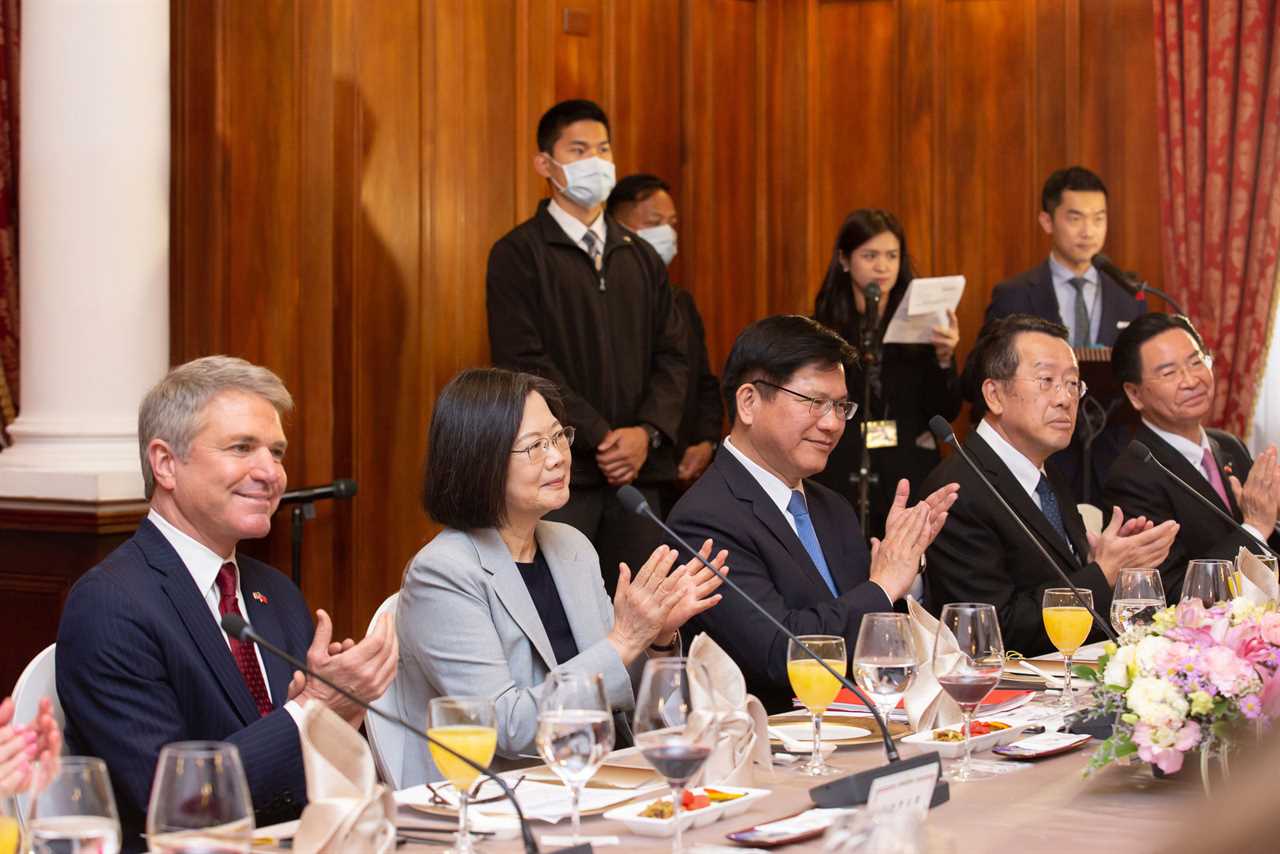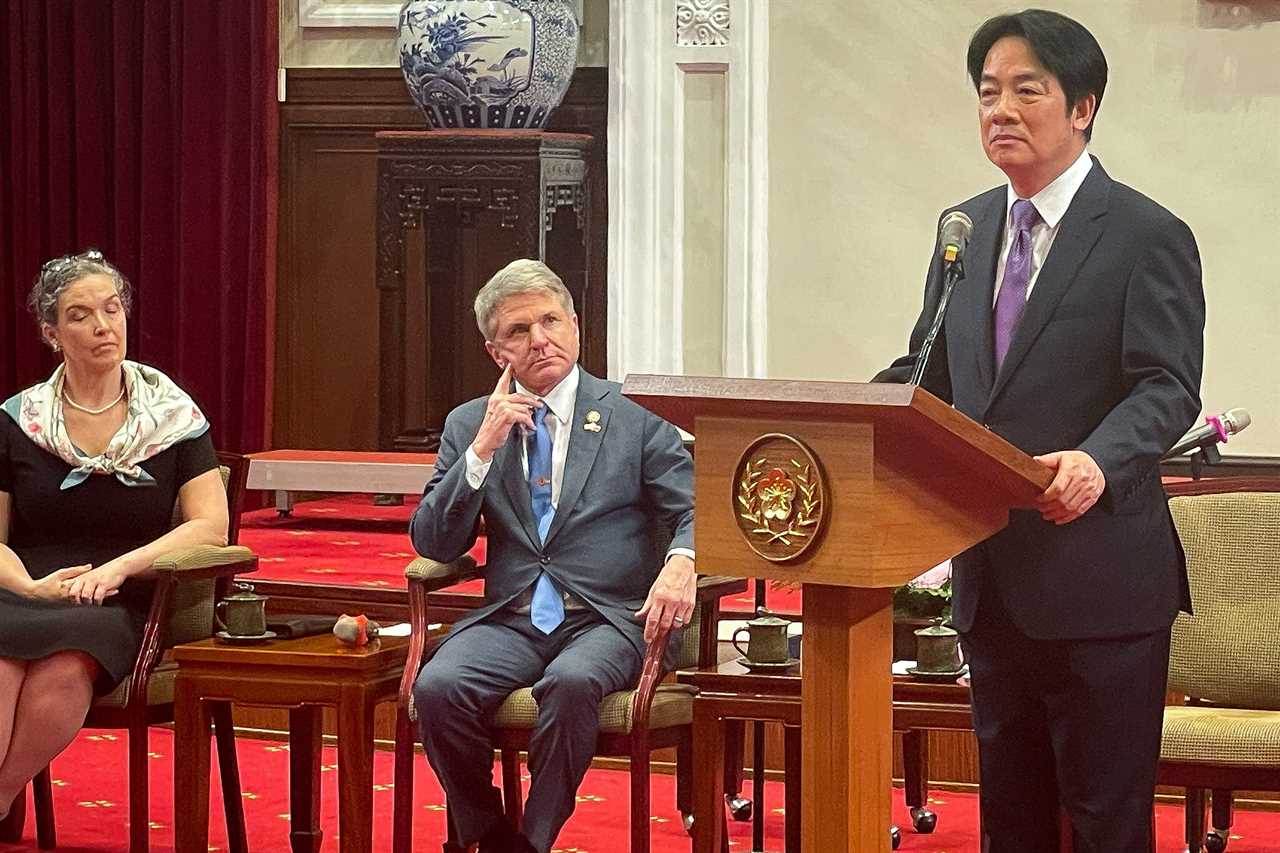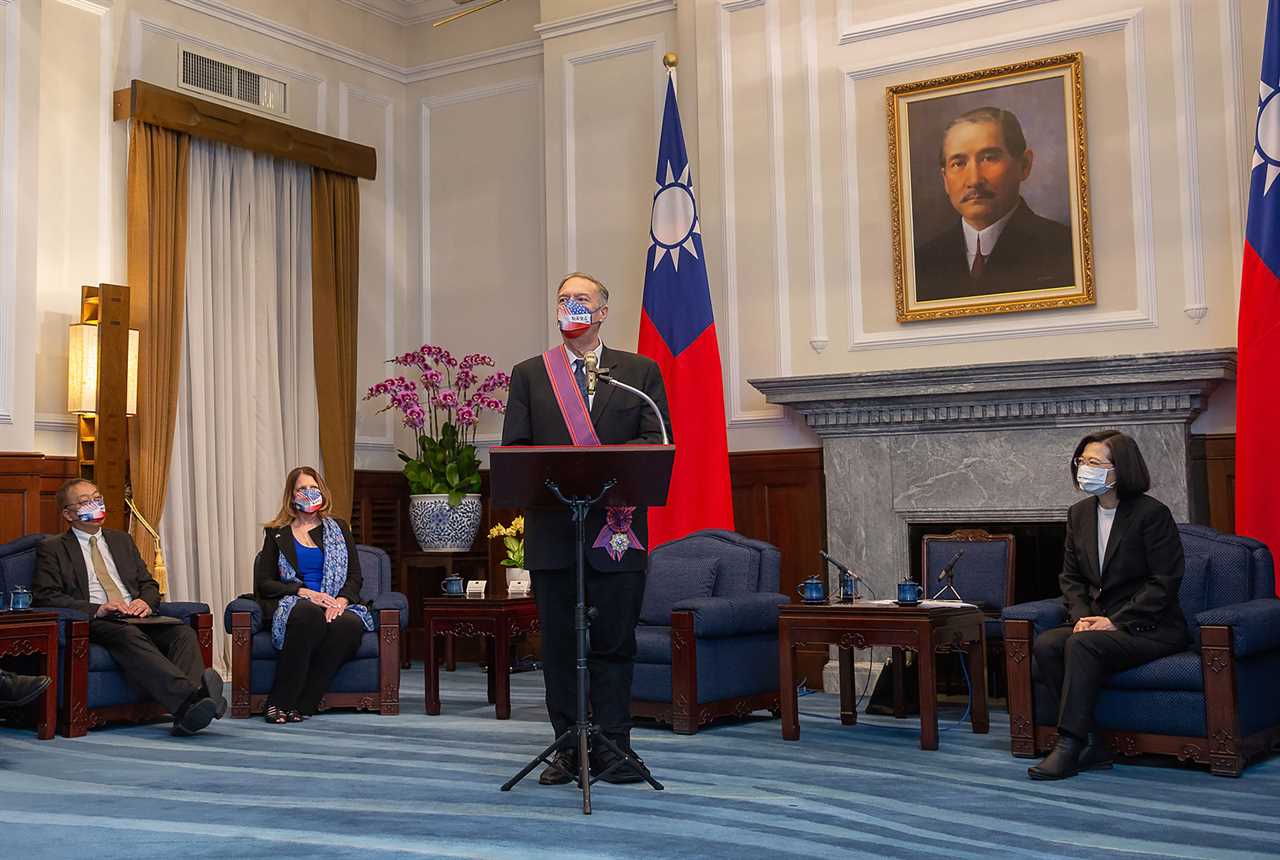
TAIPEI, Taiwan — When President Tsai Ing-wen welcomed visiting American lawmakers to lunch at a government guest house, she made no direct mention of China or its increasingly aggressive displays toward Taiwan.
That may have been just as well: Rep. Michael McCaul of Texas, the senior congressional Republican who led last week’s U.S. delegation, had already taken anti-China tough talk far enough.
McCaul, the House Foreign Affairs Committee chair, predicted in Taiwan that Beijing might ultimately invade or blockade the island should it fail to influence the presidential election there next year. He compared Chinese President Xi Jinping to Adolf Hitler while shoulder to shoulder with the Taiwanese vice president. And he did most of the talking for his American colleagues during their time in Taiwan; from press conferences to receiving lines, the leading voice was usually his.
At one point, he even seemed to dispense with the convention of so-called strategic ambiguity in U.S.-Taiwan relations, whereby America does not quite say what it would do in response to a Chinese invasion. While sharing opening remarks next to Taiwanese Vice President Lai Ching-te, McCaul shrugged off “talk about ambiguity.”

“The U.S. stands with you and will protect you,” he said.
McCaul then briefly paused at the podium to allow the translator to begin relaying his remarks to Lai and other Taiwanese officials. It was enough time for some of the members and aides sitting nearby to exchange wide-eyed looks.
And McCaul must've felt it went too far too, softening it in a later statement to POLITICO: “We protect Taiwan by arming and training them — and by being prepared to defend them, if necessary.”
The McCaul-led trip was Congress’ largest bipartisan trip to the island since the 1979 passage of the Taiwan Relations Act, a measure that codified the American commitment to support the island’s democracy without direct antagonism of China.
But in many ways, the visit was the McCaul Show. The GOP chair — whose gregariousness and sense of humor breaks from the stereotypical mold of overseas diplomats — appeared ready to stretch the ambiguity doctrine at every turn.
The U.S. delegation was the latest in a series of high-profile Taiwan-focused meetings by American lawmakers, most notably then-Speaker Nancy Pelosi (D-Calif.) last summer. Taiwan’s government has embraced the U.S. visits as a valuable show of solidarity, but they have also brought complications for the self-governing island as China consistently threatens retaliation for the American shows of support.

McCaul’s muscular rhetoric on the trip vividly illustrated the role he’s claimed for himself within the GOP, attempting to stiffen conservative spines against America’s overseas adversaries at a moment when voices on the hard right are loudly questioning the value of U.S. involvement in faraway conflicts.
That includes not only the potential defense of Taiwan, but also Russia’s war on Ukraine. During interviews throughout the U.S. delegation’s visit to South Korea and Taiwan, McCaul reinforced his view that the outcome of the Ukraine war might affect China’s behavior toward its neighbors.
“If Ukraine doesn't win and Russia is successful, they see the bullseye turning to them,” McCaul said of Asian nations where he’s visited with top officials. “This is the strategy of Putin and Chairman Xi and the unholy alliance that they've made together … I don't understand why some people just can't see it.”
But he acknowledged that he wasn’t sure Congress would rise to meet the moment in the event of a Chinese attack on Taiwan, the way it has done so far in support of Ukraine, despite the House GOP's overall more hawkish approach to Beijing versus Moscow.
McCaul's visit to Taiwan came during the same week that Tsai met in California with Speaker Kevin McCarthy (R-Calif.), a meeting China also denounced. And while McCaul's rhetoric didn't draw the domestic media spotlight in the same way, it sparked worries among his fellow members of Congress.
According to one lawmaker on the trip, a few privately shared concerns that the chair had spoken too off-the-cuff on Taiwan’s soil, where a rhetorical misstep is particularly prone to earning a reactionary response from China.
The lawmaker on the trip, speaking about McCaul’s Hitler remark on condition of anonymity, joked that it must have given heart palpitations to representatives of the American Institute in Taiwan, the U.S. diplomatic center on the island.
A second lawmaker who joined the trip, Rep. Ami Bera (D-Calif.), warned on record that “we have to be very careful with the rhetoric that we use, because sometimes the Chinese are going to interpret rhetoric that might be meant for the base of the party very literally."
“And in foreign affairs and diplomacy, I think language matters,” added Bera, one of two Democrats in the McCaul-led delegation. He declined to single out any specific cases of overly heated rhetoric.

McCaul is hardly alone in making saber-rattling comments about Taiwan while visiting East Asia. Most provocative may have been Mike Pompeo, the former secretary of State who previously served with McCaul in the House. Pompeo last year used a trip to Taiwan to call for the U.S. to recognize the island as an independent nation — the ultimate diplomatic red line for mainland China.
President Joe Biden has also engaged in McCaul-style gestures toward ditching strategic ambiguity. He has repeatedly indicated that the U.S. would defend Taiwan from an invasion, only to have his aides walk it back in the press.
But McCaul's remarks underscored a reality that the Brookings Institution warned about in an analysis published while he was on the ground: American politicians who go too far in defense of Taiwan run the risk of drawing unwanted Chinese attention to the island.
A “client” state like Taiwan might normally enjoy support from a “patron” state like America, the Brookings authors wrote. But when “its security environment appears to be deteriorating, a client might not welcome signals of support from the patron if the client considers those signals to be so provocative that they undermine its security.”
The security risks are real. Hours before McCaul met with Tsai, China announced three days of live-fire military exercises around the island. Beijing imposed sanctions on the hosts of Tsai's meeting with McCarthy, bringing U.S.-China relations to a recent low point, and later separately announced sanctions against McCaul, which he deemed a "badge of honor" in a statement.
But in an interview, McCaul didn't back down. He stood by his comparison between Xi and Hitler, arguing that Russia and China together presented a threat unseen in generations.
“We really haven't seen anything quite like this, on this scale and a threat to Europe and the Pacific, since World War II,” the 61-year-old said.
McCaul has made it his personal mission to enlist other Republicans in support of hawkish foreign policy, even as loud voices on the right — including Donald Trump — have questioned America's interest in countering China and confronting Russia's invasion. He brought fellow Texas GOP Reps. Keith Self and Jake Ellzey with him on a recent Ukraine trip, part of what Rep. Brian Fitzpatrick (R-Pa.) called his effort to “educate” Republican colleagues.
He's particularly active on the U.S. airwaves.
“I joke with Mike because every time I turn on the Sunday TV shows, I'll see McCaul. And then I'll click over to the next channel, and I'll see McCaul,” Fitzpatrick said in an interview. “He gets more TV time than the speaker.”
In the interview, McCaul notably declined to criticize Trump’s approach to both Xi and Putin. Trump “at least projected strength,” the GOP lawmaker said, alleging that Biden “seems so weak” compared with his predecessor.
McCaul even argued that Trump’s “personality probably prevented an invasion” of Ukraine during his administration and “certainly would have deterred Chairman Xi from invading Taiwan” — both dubious claims, given the former president’s past praise for both Xi and Putin.
The former president’s polling lead in the 2024 primary could soon force McCaul and other GOP backers of Ukraine to grapple with a standard-bearer whose foreign policy views clash with theirs.
While McCaul steered clear of Trump, he conceded that he is not certain Congress would be prepared to vote to authorize or otherwise fund a U.S. military response should Beijing escalate: "I do worry about that," he said.
Even as he reiterated one-on-one that he wouldn't shrink from supporting a military response against China, he used a public press conference in Taipei to sound a note of characteristic bravado that may or or may not go over well in Beijing.
Asked by a reporter near the end of his trip if officials like Tsai had shared concern privately about his harsh rhetoric, McCaul responded that the Taiwanese president “welcomes” the American lawmakers' backing, particularly because it was bipartisan.
"Obviously," he added about China, "you don't want to poke the Panda."
----------------------------------------
By: Olivia Beavers
Title: Up close in Taiwan with the Republican who compared Xi to Hitler
Sourced From: www.politico.com/news/2023/04/15/mccaul-taiwan-china-00091601
Published Date: Sat, 15 Apr 2023 06:00:00 EST
Did you miss our previous article...
https://consumernewsnetwork.com/politics-us/nikki-haleys-fuzzy-fundraising-math






